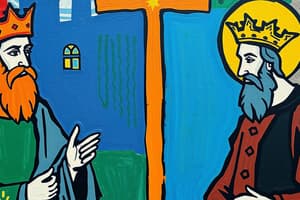Podcast
Questions and Answers
What was St. Augustine's real name?
What was St. Augustine's real name?
- Aurelius Augustinus (correct)
- Marcus Aurelius
- Augustus Aurelius
- Lucius Aurelius
Which of the following accurately describes St. Augustine's relationship with his father?
Which of the following accurately describes St. Augustine's relationship with his father?
- His father encouraged him to become a bishop.
- His father was a Christian theologian.
- His father converted to Christianity before his death.
- His father remained a pagan until his death. (correct)
At what age did St. Augustine die?
At what age did St. Augustine die?
- 76 years old
- 54 years old (correct)
- 72 years old
- 64 years old
Which of the following subjects did St. Augustine dislike?
Which of the following subjects did St. Augustine dislike?
Where was St. Augustine born?
Where was St. Augustine born?
What significant philosophical influence prompted Augustine to abandon his legal career?
What significant philosophical influence prompted Augustine to abandon his legal career?
Which event occurred first during Augustine's early life?
Which event occurred first during Augustine's early life?
Which of the following statements about Augustine's relationship with his concubine is true?
Which of the following statements about Augustine's relationship with his concubine is true?
What was the purpose of Augustine's teaching career after returning to Tagaste?
What was the purpose of Augustine's teaching career after returning to Tagaste?
What role did Bishop Ambrose play in Augustine's life during his time in Milan?
What role did Bishop Ambrose play in Augustine's life during his time in Milan?
Flashcards are hidden until you start studying
Study Notes
Life of St. Augustine
- Full name: Aurelius Augustinus
- Born on November 13, 354 AD in Thagaste, Numidia, North Africa
- Died in 430 AD
- Notable titles: Bishop of Hippo, Doctor of the Church
- Mother: Monica (Christian), Father: Patricius (Pagan), Siblings: Navigius and Perpetua
- Relationship history includes a long-term concubinage and a son named Adeodatus, born in 372 AD
Early Life and Education
- Early education marked by disinterest in studies, preferring play over academics
- Stole fruit from a pear tree, reflecting on the nature of sin
- Studied Rhetoric in Madaura, then returned to Thagaste to teach grammar
- Emphasized the importance of Rhetoric for law and public service careers
Adolescence and Philosophical Development
- Fell into Manichaeism, a sect mixing Christian and dualistic beliefs
- Experienced an "intellectual conversion" after reading Cicero's "Hortensius"
- Felt torn between philosophical pursuits and strong sensual desires
Teaching Career and Move to Milan
- Established a school of Rhetoric in Carthage after his best friend's death
- Moved to Rome in search of new opportunities, deceived mother to avoid following
- Became a professor of Rhetoric in Milan
- Influenced by Bishop Ambrose's sermons, leading to a spiritual awakening
Conversion and Baptism
- Spiritual conversion in 386 AD, encouraged by the phrase "Tolle Lege"
- Baptized on April 24, 387 AD by Bishop Ambrose, alongside Adeodatus and Alypius
- Monica, his mother, died that summer
Bishopric and Later Life
- Became Bishop of Hippo in 396 AD
- Advocated for oppressed groups: donatists, prisoners, and orphans
- Founded a monastery in Tagaste after his own conversion
Works and Contributions
- Authored influential theological texts including:
- "The Confessions" (397 AD)
- "On the Trinity" (399 AD)
- "The City of God" (413 AD)
- Compiled over 100 books, 240 letters, and 500+ sermons
- Recognized for profound influence on Christian theology and philosophy
Canonization and Feast Day
- Became a saint by popular acclaim, recognized as a Doctor of the Church in 1298
- Feast day celebrated on August 28
- Patron saint of brewers, printers, theologians, and associated with numerous cities
Notable Augustinian Saints
- St. Thomas of Villanova: Advocate for the poor, established educational institutions, served as Archbishop of Valencia. Feast day on October 10.
- St. Ezekiel Moreno: Focused on missionary work in the Philippines and Colombia, died of cancer in 1906. Feast day on August 19.
- St. Fulgentius: Influenced by St. Augustine, involved in the African Church, served under the Vandals. Feast days on January 1 and 3.
Lasting Legacy
- St. Augustine's teachings continue to shape Christian thought, contributing to discussions on morality, theology, and philosophy. His insights remain relevant in modern theological debates.
Studying That Suits You
Use AI to generate personalized quizzes and flashcards to suit your learning preferences.




